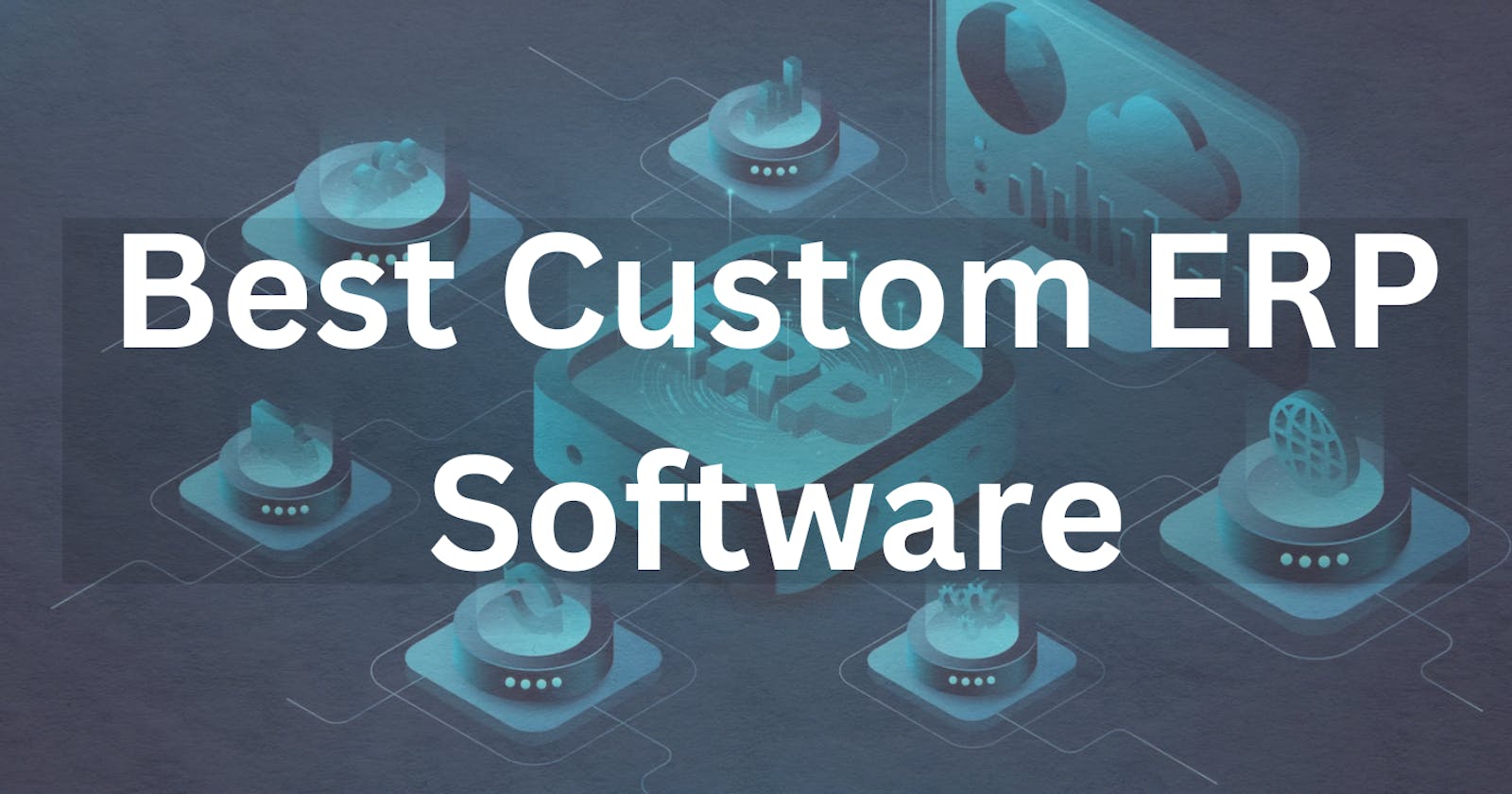Table of contents :
Definition of Enterprise Resource Planning (ERP).
Benefits of ERP system.
Features of ERP system.
Working of ERP software.
Types of ERP deployment
Factors Affecting enterprise resource planning cost .
Introducing CB enterprises custom ERP software.
Why is CB Enterprises' custom ERP software the best ?
Conclusion
Enterprise Resource Planning (ERP) software is a comprehensive suite of integrated applications designed to manage and automate core business processes such as finance, human resources, inventory management, supply chain, and customer relationship management. ERP systems centralize data and provide real-time visibility across an organization, facilitating decision-making and improving operational efficiency.
Benefits of ERP system :
Increased efficiency: ERP streamlines processes, reducing manual tasks and improving workflow efficiency.
Enhanced productivity: With automated processes and centralized data, employees can focus on strategic tasks, boosting productivity.
Better data accuracy: ERP eliminates data silos and ensures consistency, leading to improved data accuracy and reliability.
Improved collaboration: ERP facilitates communication and collaboration across departments, fostering teamwork and innovation.
Streamlined processes: By integrating various functions, ERP optimizes workflows, eliminating redundancies and improving overall efficiency.
Cost savings: Automation and optimization provided by ERP lead to cost savings through reduced errors, improved resource allocation, and better inventory management.
Prior to delving into the features of Enterprise Resource Planning software, we invite you to watch our demonstration video showcasing custom ERP software in operation.
How to create Enterprise Resource Planning Software for the CSM team? ERP Solution | CB Enterprises
Features of ERP system :
Finance management: ERP includes modules for accounting, budgeting, invoicing, and financial reporting to manage finances effectively.
Human resources management : It offers tools for managing employee data, payroll, benefits administration, recruitment, and performance evaluation.
Supply chain management: ERP helps streamline procurement, inventory management, order fulfillment, and supplier relationship management.
Reporting and analytics: ERP provides insights through customizable reports and dashboards, helping businesses make data-driven decisions.
Robust Security Measures : Implement stringent security protocols to safeguard sensitive data, ensuring confidentiality, integrity, and availability of information within the ERP ecosystem.
Working of an ERP solution :
Integrated Modules and Database Connectivity : ERP systems are interconnected modules or business applications that communicate with each other and share a centralized database.
Focused Modules for Business Areas: Each ERP module typically caters to a specific business function, such as finance, accounting, human resources, sales, procurement, logistics, and supply chain management. However, they collaborate using shared data to fulfill the company's requirements.
Customizable Module Selection : Companies have the flexibility to select and implement the modules that best suit their needs. They can start with popular areas like finance or HR and gradually expand by adding more modules as necessary.
Support for Industry-Specific Requirements: ERP systems accommodate industry-specific demands either through built-in core functionalities or by integrating application extensions seamlessly into the suite.
Procurement Options : ERP software can be procured through On-premise model , Cloud based model or Hybrid model ,providing companies with options based on their preferences and operational requirements.
Types of ERP systems:
On-premise: ERP software is installed and maintained on-site, providing full control and customization but requiring significant upfront investment and IT resources.
Cloud-based: ERP is hosted on remote servers and accessed via the internet, offering flexibility, scalability, and lower upfront costs but relying on third-party providers for maintenance and security.
Hybrid: Combining on-premise and cloud solutions, hybrid ERP offers the benefits of both deployment models, allowing businesses to leverage existing infrastructure while taking advantage of cloud scalability and accessibility.
Factors Affecting Enterprise Resource Planning cost :
Software licensing: Costs associated with purchasing ERP software licenses, which can vary depending on the vendor and features included.
Implementation and customization: Expenses related to implementing and customizing ERP software to fit the specific needs of the organization.
Hardware infrastructure: Costs of hardware infrastructure required to support the ERP system, including servers, networking equipment, and storage.
Training and support: Expenses for training employees and providing ongoing support and maintenance for the ERP system.
Scalability requirements: Costs associated with scaling the ERP system to accommodate business growth and changing needs.
Ongoing maintenance and upgrades: Costs of maintaining and updating the ERP system to ensure it remains secure, reliable, and up-to-date with the latest features and technology.
Presenting CB Enterprises' custom ERP software:
As a premier provider of bespoke ERP software solutions, CB Enterprises excels in delivering customized ERP solutions perfectly aligned with businesses' distinct requirements. Our dedication to quality and ingenuity distinguishes us within the industry, establishing us as the preferred partner for organizations pursuing revolutionary software solutions. Our custom ERP software is meticulously crafted to cater specifically to your needs.
Why is CB Enterprises' custom ERP software the best ?
Customized for You: We make ERP solutions designed just for your business, whether it's creating new software or improving what you already have.
Easy to Use Everywhere: Access your ERP easily on mobile, web, or desktop, with a simple interface that keeps users happy.
Advanced Technology: We use the latest tech like blockchain, Magento, IoT, and Salesforce to make our ERP software better and more adaptable.
Quick Development: Our team can get you a basic version of your ERP system in just two months, so you can start using it fast.
Full Support: We help you every step of the way, from designing your ERP system to keeping it running smoothly.
Grows with You: Our ERP systems can grow as your business does, without any worries about hitting limits.
Strong Security: We take your data security seriously, using strong protections to keep it safe from cyber threats.
Always Improving: We keep your ERP system up-to-date with regular updates and improvements.
Easy to Learn: We provide training and support to help your team learn how to use the ERP system smoothly.
Conclusion:
Enterprise Resource Planning (ERP) software plays a vital role in modern business operations by streamlining processes, enhancing productivity, and facilitating informed decision-making. By understanding the definition, benefits, features, working, deployment types, and cost factors of ERP systems, businesses can harness the power of technology to gain a competitive edge in today's dynamic market landscape. Consider CB Enterprises' custom ERP software to optimize your business processes and drive success.

